The Socialist Chef of Wausau
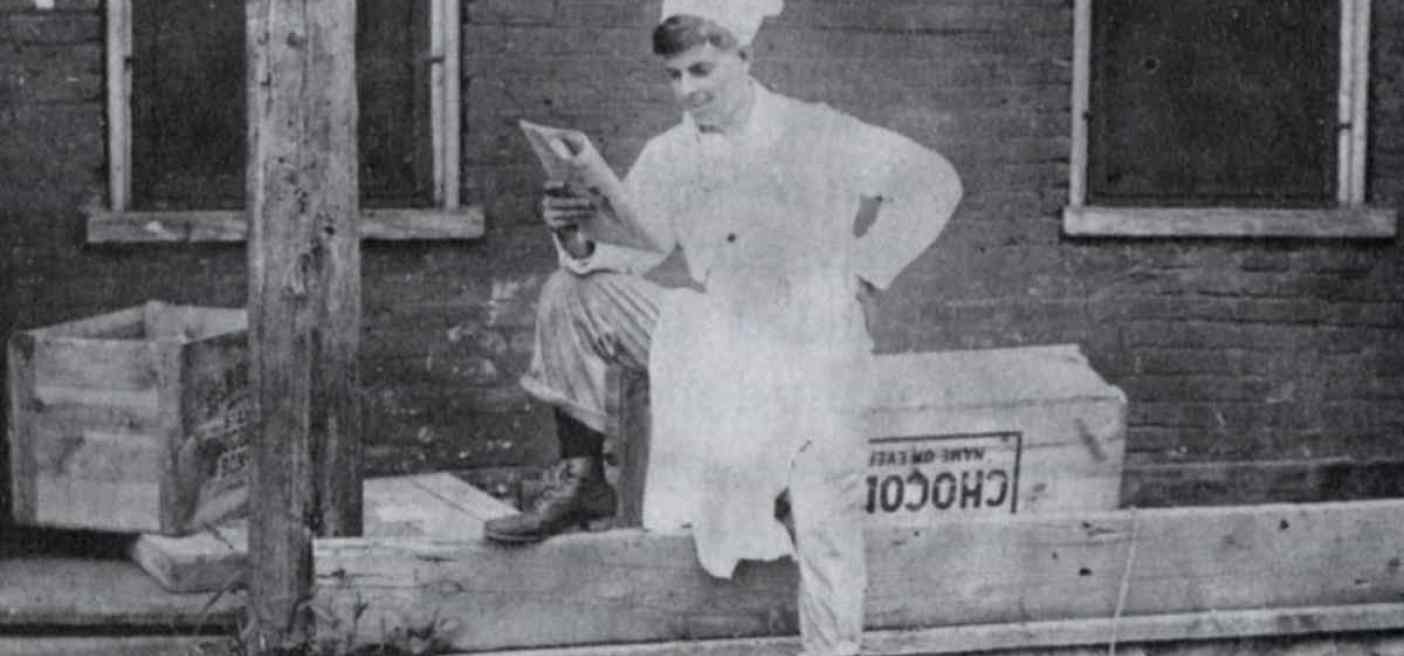
Herman A. Marth, The Socialist Chef of Wausau
This February marks the 100th anniversary of the election of Wausau chef and restaurateur, Herman A. Marth to the Wisconsin Assembly. His election was a surprise that few saw coming, because Marth won the election on the Socialist Party ticket.
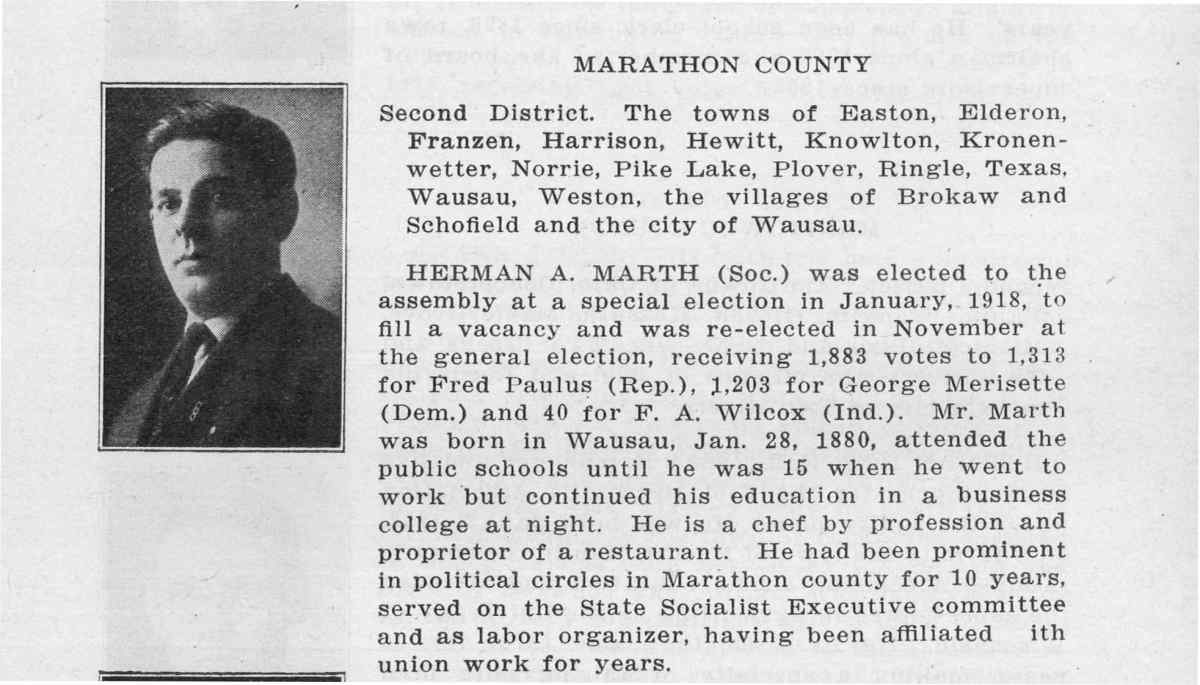
^ Herman Marth's official biography from the 1919 Wisconsin blue book.
The Rise of the Wausau Socialists
In 1917, Republican D.S. Burnett resigned his seat as Second District Assemblyman for Marathon County, which prompted a special election to fill the vacancy. Herman Marth, Wausau chef, resturant owner, and dedicated member of the Socialist Party since 1911, became the suprising front-runner in the election.
Although the Socialist Party in Marathon County was tiny, Herman Marth was popular enough to scare the Republican and Democratic establishment of Wausau into coming together to oppose him. The Democrats dropped out of the race in favor of backing the Republican Ernest Dunn; who was talked up as the man who would “give the soldier boys that loyal support to which they are entitled” and whose election would “send a message of cheer to the boys at the front.” The Socialist platform called for an immediate end of involvement in the First World War, and the newspapers made sure to tell its readers that the upcoming vote was not simply a vote for a candidate, but a stark contrast between loyalty and disloyalty.
Nevertheless, Marth carried the vote 3-1 over Dunn to become the Assemblyman for Wausau’s Second District. And over the next year, Marathon County voters would continue electing Socialists to government positions ranging from District Attorney and the First District Assembly seat to the Register of Deeds and County Treasurer.
| Emil Tesch: Sheriff | Herman Habeck: Register of Deeds |
| George Lippert: District Attorney | Frank Novak: Clerk of Courts |
| Edwin Bruss: County Clerk | Charles Zarnke: First District Assembly Seat |
| Frank Damrow: County Treasurer | Herman Marth: Second District Assembly Seat |
The Socialists put up candidates in every race they could, as Marshall Duranso found to his dismay. He was one of the small number of members of the Party in 1918, and one night he came home from work to the surprising news that his name had been put up as a candidate for City Alderman without consulting him. He was not happy about this, especially after his boss at Marathon Box Co. made it clear that if he was elected on the Socialist ticket, he would “have to look for other work.” Not wanting to lose his job, he refused to campaign and made sure his family didn’t vote for him. But he still only lost the race by a single vote: 128-127.
“[the Socialist Party in Wausau] wasn’t as big as the town folks thought it was, there were only seven of us … only seven of us and that one year we had the town crazy.”
- Marshall Duranso in an oral history interview, 1975.
A Socialist publication made in 1919 excitedly informed Marathon County readers how pleased they were with Marth’s record in the Assembly, which included strong votes of support for agrarian and labor-oriented policies. The Milwaukee-published work had headlines boasting that “[Marathon] Was the First Rural County to Break Away from the Clutches of Big Biz Politicians.”
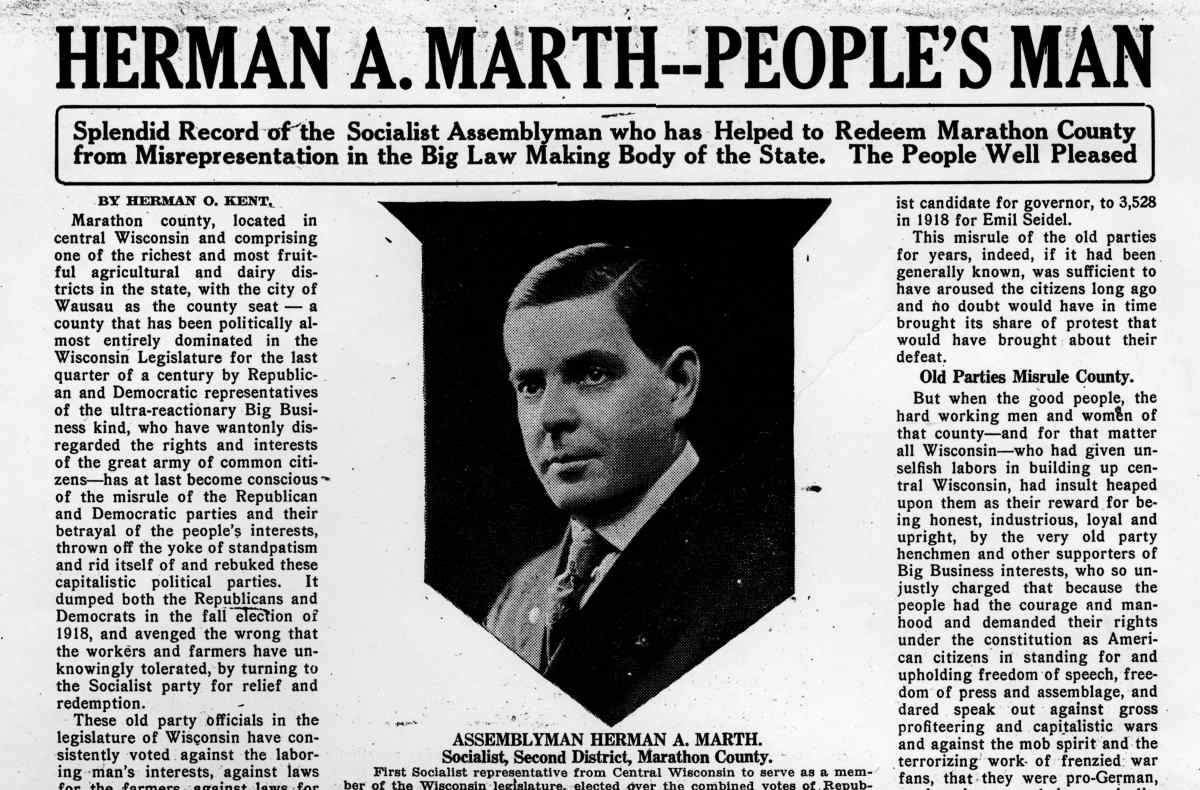
^ Front page of a one-off Socialist paper, published in Milwaukee in 1919, praising Herman Marth and “educating” Marathon County of his successes. MCHS Research Library.
But, while it was true that the Wausau Socialists did have supporters, it was far from the start of a Revolution of the farmers against their capitalist oppressors that the Milwaukee Socialists hoped. Instead it appears to have been thanks to a sizable protest vote from the German-Americans of Marathon County.
Marathon County during the First World War
In the lead up to direct American involvement in the First World War, most German-Americans wanted nothing to do with the war and were strong proponents of neutrality. But in April 1917 the United States entered the Great War against Germany, and most German-Americans resigned themselves to the war and joined the nation in patriotic efforts to ensure victory.
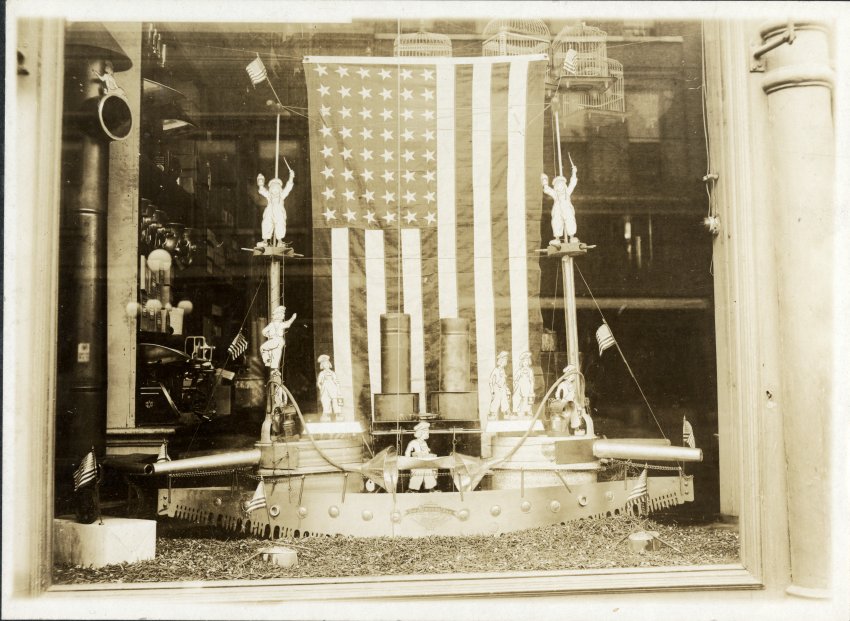
^ A patriotic display in the window of a Wausau Store, taken two weeks after the United States entered WWI, April 20, 1917. MCHS Photo Collection.
Marathon County joined the rest of Wisconsin in sending volunteers to the military, they exceeded the quotas of war bonds purchased, and the County dedicated itself to increasing food production and reducing food waste to ensure our soldiers oversees could be adequately supplied (and to feed their new allies across Europe). For German-Americans in cities and farms across Marathon County, their German ancestry and culture took a backseat to their identities as Americans. Although not everyone was enthusiastic about the fighting in Europe, for the most part, any fears of a German insurrection by immigrants in Wisconsin were based on nothing.
But of course that did not stop super-patriotic Americans from scrutinizing their ethnically German neighbors for any sign of disloyalty. From unofficial vigilantes who took up the self-appointed task to suppress anyone with perceived pro-German attitudes, to official laws such as the Espionage Act that gave the government broad and unchecked power over American citizens, the United States during wartime was anything but a safe place for freedom of speech and civil liberties.
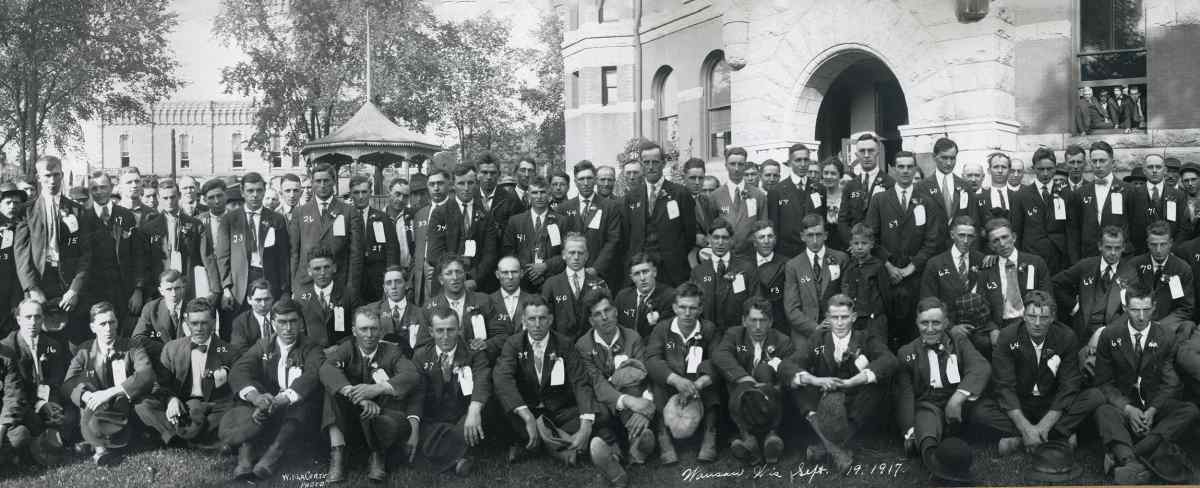
^ Marathon County men volunteering for military service in WWI pose for a picture outside the Courthouse. From September 1917. MCHS Photo Collection.
Tired of having their loyalties continually questioned and of hearing their government representatives demonize all things German for the sake of patriotism, many German-Americans turned out at the polls to support Socialists as a protest vote.
The Fall of the Wausau Socialists
In 1919 Herman Marth attempted to translate his popularity into a bid for the office of Wausau mayor, but lost by the slim margin of 246 votes. It was a sign of things to come.
The support the Socialist Party had in Marathon County cooled for a number of reasons. After the small number of young Socialists found themselves suddenly elected to important positions, they realized the difficulties in effectively governing, and their time in charge was marred by more than a few controversies.
The end of the Great War in 1919 gradually led to a return to peacetime atmosphere free of repression and recrimination of anything close to pro-German. They also faced increasing political competition from a resurgent Republican Party, as well as the "Nonpartisan League," whose pro-business platform undermined Socialist support after receiving the endorsement of local labor leaders. The rise of the Soviet Union in Russia also helped fuel a national fear of radical Communism, which the critics of the Wisconsin Socialists were more than happy to extend to Marth and his friends.
Without the protest vote from the German-Americans, and with their urban, working-class support base split, the Socialists in Marathon County were doomed.
In 1920, the Socialist chef of Wausau lost his Assembly seat to a Republican Cook (Lewis H. Cook from Unity). Marth received only 3,204 votes to Cook’s 5,084.
Some Wausau Socialists left the party to ally with La Follette's Progressive wing of the Republicans Party, such as District Attorney George Lippert. Some Socialists were forced to leave politics for good, and at least one man was forced to leave town altogether after being blacklisted by Marathon County employers for his political activities.
But Marth remained dedicated to the Socialist cause. He held a seat on the executive committee for the Wisconsin Socialist Party off and on for a many years and held other positions representing his home in Wisconsin politics. He was even tapped as a candidate again in 1946 when he was put up against Clifford “Tiny” Krueger of Merrill for the 35th District seat in the Wisconsin Senate--he came in a distant third (with only 601 votes) to the Republican Krueger (16,859) and the Democrat write-in William McNeight (7,827).
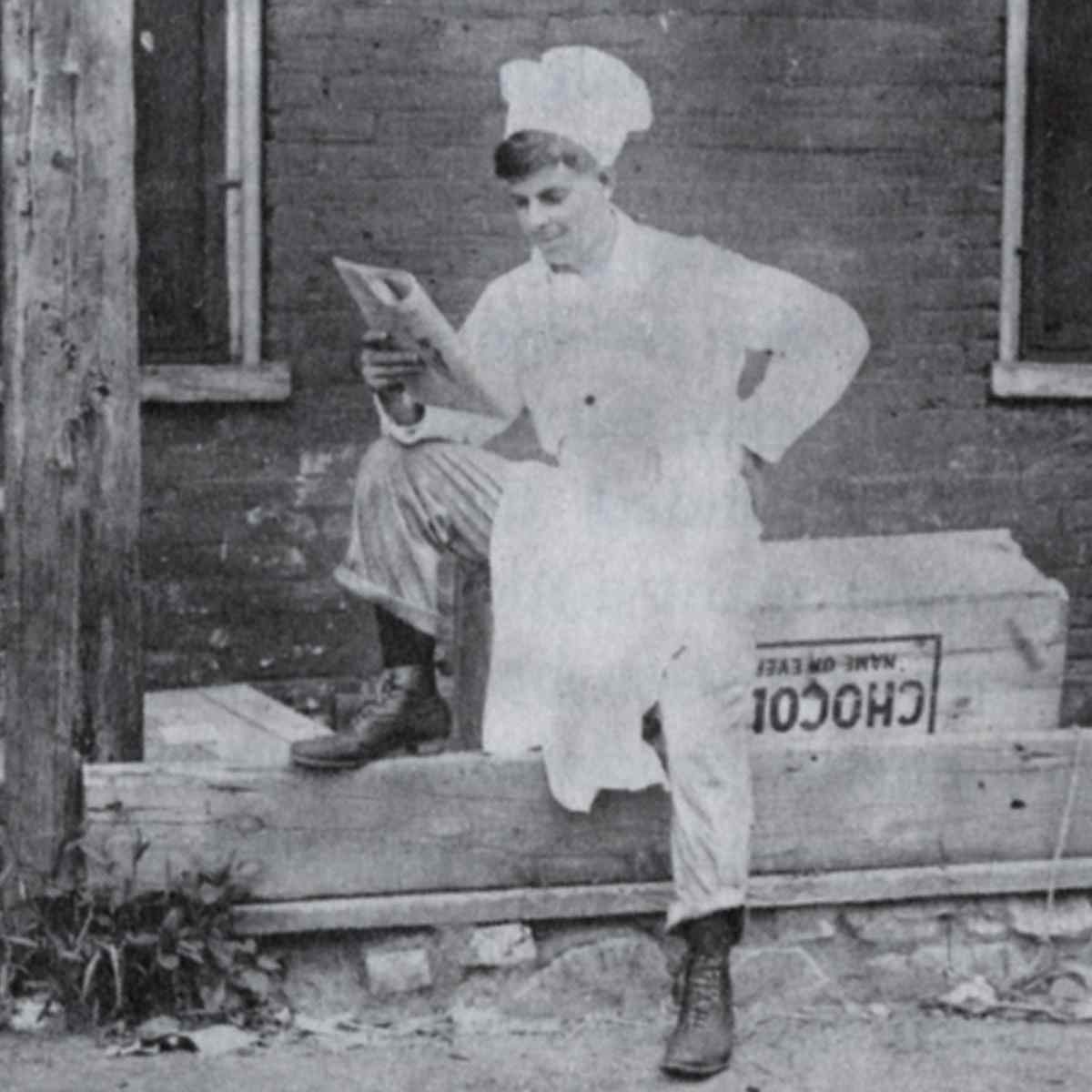
^ "The Honorable Herman Marth" poses for a photograph. From Klueter and Lorence's book Woodlot and Ballot Box (Stevens Point: Worzalla Publishing Co, 1977).
As was the case with other Socialists, Marth's profile in Wausau fell considerably after losing his Assembly seat. In 1919 he owned his own restaurant (the Delmonica), but in 1920 he was no longer part of that business. Over the next decade he would work as a cook at a number of cafes and restaurants in Wausau. City Directories show that by the mid-1930s he had left the culinary industry to work as a laborer in manufacturing—including a long stretch at the Silcrest factory (a precursor to Crestline), but for the most part the historical record unfortunately forgets the honorable Herman A. Marth in the last few decades of his life.
It is safe to say that Herman and his fellow Socialists certainly left a unique and remarkable impact in the historical record of Marathon County with their suprising political success a century ago in 1918.
